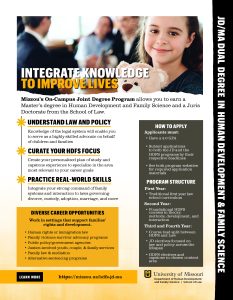Mizzou’s on-campus dual degree program allows you to earn a Master’s degree in HDFS and a Juris Doctorate from the School of Law in only four years. Develop skills to navigate the legal system, translate research, and advocate for children, youth, and families.
UNDERSTAND THE INTERSECTION OF HUMAN AND LEGAL SYSTEMS
Knowledge of the legal system will enable you to serve as a highly-skilled advocate on behalf of children and families.
CURATE YOUR LEARNING
Create your personalized pan of study and capstone experience to specialize in the area most relevant to your career goals.
PRACTICE REAL-WORLD SKILLS
Integrate your strong command of family systems and interaction to laws governing family transitions, human rights, and more.
Students completing the following course of study will be eligible to receive a JD degree from the School of Law and an MS or MA degree in Human Development and Family Science (HDFS). This course of study may be completed in only four years. Typically, students require three years to complete the requirements for the JD degree and two years to complete the requirements for the Master’s degree.
First Year:
Students take the traditional first year courses offered by the Law School.
Second Year:
Students take foundational theory, methods, and relational and developmental sciences courses in HDFS, plus one law course in the fall and two law courses in the spring.
Third and Fourth Years:
Students take courses and electives from both HDFS and the Law School.
Requirements for the MS/MA degree in HDFS are met with 27 credit hours of courses in the Department of Human Development and Family Science (12 required), 3 required and 6 elective credit hours within the School of Law, for a total of 36 credit hours. While approval of a detailed program of study does not require approval from the School of Law, it is strongly recommended that dual degree students obtain academic counseling from a law faculty member.
HDFS Courses are selected from:
- Statistics, research methods
HDFS 8200 Research Methods (3)
Statistics (7000 level or higher) (3)
- Theory
HDFS 8220 Family Theories (3), or
HDFS 8210 Theories of Human Development (3) - Electives Students must take a minimum of 9 HDFS electives, 6 of which must be 8000 level
HDFS 7001: Contemporary Issues in Family Science (3)
HDFS 7001: Contemporary Issues in Human Development (3)
HDFS 7252: Adult Development and Aging (3)
HDFS 7300: The Black Families (3)
HDFS 7620: Family Interaction (3)
HDFS 7640: Interpersonal Relationships (3)
HDFS 8012: Family Dynamics and Intervention (3)
HDFS 8087: Poverty (3)
HDFS 8300: Advanced Seminar on Multicultural Families (3)
HDFS 8410: Infancy and Childhood (3)
HDFS 8450: Adolescence and Emerging Adulthood (3)
* Or any advisor-approved HDFS graduate-level course.
- Capstone
HDFS 8090 Project (3), or
HDFS 9090 Thesis (3-6)***Students must petition the graduate committee to complete a thesis and earn a Master of Science degree

Graduates from the dual JD/MA or JD/MS programs work in a variety of settings that support individuals and families navigate the legal system.
- Family law and mediation
- Human rights or immigration law
- Family violence survivor advocacy
- Justice-involved children, youth, and family services
- Public policy and government agencies
Why Mizzou HDFS?
- Mizzou HDFS ranked #6 nationally in value by Great Value Colleges of all family and consumer sciences departments
- Excellent national reputation and ranking among HDFS doctoral programs
- Collegial and supportive culture
- Over $100,000 awarded annually from department, college, and university fellowships
- Exceptional post-graduation employment rate
- Award-winning mentorship from nationally-recognized faculty
- Curated plan of study prepares you for the career you want
- Opportunities to conduct research, publish, and present at conferences
- Free professional development workshops